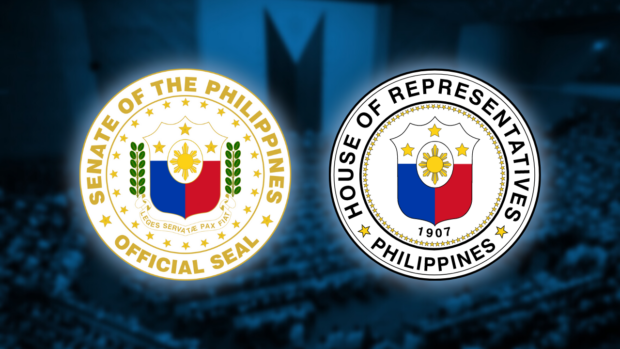Marcos was already clear on Cha-cha, House lawmakers say

COMPOSITE PHOTO Senate of the Philippines and House of Representatives/INQUIRER FILES
MANILA, Philippines — House lawmakers do not see the need for President Ferdinand Marcos Jr. to persuade senators to vote in favor of proposed amendments to the 1987 Constitution, as the Chief Executive has made his stand towards economic Charter change very clear already.
During Monday’s press briefing, 1-Rider party-list Rep. Ramon Rodrigo Gutierrez was asked regarding Senator Sonny Angara’s statements in a radio interview with DWIZ over the weekend, where he said that Marcos may need to help him convince senators to vote in favor of Resolution of Both Houses (RBH) No. 6.
To push forward with constitutional amendments, Congress should be able to get a two-thirds vote of all its members — which means RBH No. 6 needs 18 affirmative votes from senators if both chambers vote separately. However, Angara fears that around seven or eight senators might not vote in favor of RBH No. 6.
But Gutierrez said the President has already made it very clear that economic Charter change is essential for the country to progress.
“I think the messaging was clear. It was made very, very clear, for us at least, the signal from the President was when we were celebrating National Constitution Day, when he spoke before Philconsa (Philippine Constitution Association) that charter change should be pushed through. So, I do not see any reason how our good colleagues in the Senate would need any more convincing,” Gutierrez told reporters.
Article continues after this advertisement“Because precisely, first and foremost, all the convincing that they need should be done at the sub-committee. We should be deciding on this matter on the merits of the bill itself rather than the personalities that are pushing for it. So for our colleagues in the Senate to have to rely on further convincing by the President, I think on our part, we just want to renew our calls for them to just stick to their RBH 6,” he added.
Article continues after this advertisementDeputy Speaker David Suarez meanwhile believes the hearings of both the Senate sub-committee and the House committee of the whole can provide insights that would lead senators into thinking that the economic Charter change is necessary.
Suarez also thinks that asking Marcos to persuade senators is a bit too much since the President has already laid his reasons for supporting the proposed amendments.
“Well on my part, I think they have many hearings about economic amendments for our constitution and that should be sufficient information and knowledge for the good senators to determine why it is necessary for our country,” Suarez explained.
“A call to the President and asking him to convince Senators further, I think is a little bit asking for a little bit too much of the President because given that he President has already mentioned it many times in many occasions, given that the President has stated his position on economic amendments that are really needed by the country,” he added.
Angara in the DWIZ interview said that he feels that asking senators to support RBH No. 6 will be a challenge since Senators Cynthia Villar and Koko Pimentel believe they have the numbers to stop the economic Charter change.
“I see it as a challenge because our colleagues, Senator Villar, Senator Pimentel, say that according to their count, around seven or eight would not vote against it. While it can be higher or lower, but if you have that number — the number we need is 18 out of 24 — so if you have seven who are against it, you cannot get the vote to amend the Constitution,” Angara said.
“So definitely this is very challenging and we need to combine the efforts of the leadership of both Houses of Congress, and maybe we need President Marcos to help convince because it’s different when a President appeals or asks for help. That would bear more weight than a mere Senator Angara appealing to his colleagues,” he added.
RBH No. 6 is being tackled in the Senate, while the House discusses RBH No. 7 — a counterpart measure derived from the senators’ proposal.
READ: House committee of the whole approves RBH 7
Under RBH No. 7, these three provisions in the Constitution would be amended by adding the phrase “unless otherwise provided by law”:
- Section 11 of Article XII (National Patrimony and Economy), where the phrase “unless otherwise provided by law” is inserted in the provision that bars foreign ownership of a public utility shall except in a case where 60 percent of the total capital belongs to Filipino citizens
- Section 4 of Article XIV (Education, Science and Technology, Arts, Culture, and Sports) where the phrase “unless otherwise provided by law” is inserted in the provision that bars foreign ownership of basic educational institutions except in a case where 60 percent of the total capital belongs to Filipino citizens.
- Section 11 of Article XVI (General Provisions) where the phrase “unless otherwise provided by law” is inserted in two portions: first, the provision that bars foreign ownership in the advertising industry except in a case where 70 percent of the total capital belongs to Filipino citizens; and in the provision that limits foreign investors participation in entities to how much their capital share is
If the proposed amendments are approved by the House and the Senate and are ratified in a plebiscite, it would allow Congress to pass laws that would prescribe the rate of foreign ownership for these industries.